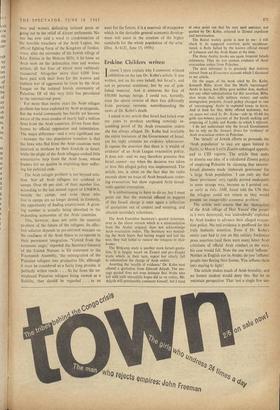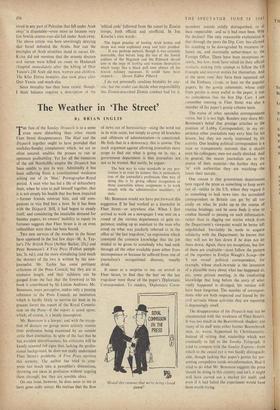Erskine Childers writes:
T THINK l must explain why I comment without linhibition on the late Dr. Kohn's article. It was written, not on his own behalf, but Israel's; and not in personal testimony, but by use of pub- lished material. And it concerns the fate of 650,000 human beings. I could not, honestly, treat the above version of their fate differently from previous versions, notwithstanding the news of Dr. Kohn's death.
I stated in my article that Israel had failed over ten years to produce anything remotely re- sembling proof of the Arab evacuation orders she has always alleged. Dr. Kohn had available the entire resources of the Government of Israel, yet his reply contains no evidence whatsoever. It repeats the assertion that there is `a Wealth of evidence' of an Arab League evacuation policy. It does not—and we may therefore presume that Israel cannot—say when the decision was taken or how this alleged policy was implemented. The article, too, is silent on the fact that the radio records show no trace of Arab broadcasts order- ing evacuation; but show repeated Arab broad- casts against evacuation.
It is embarrassing to have to do so, but I must point out that the material offered in support of this Israeli charge is once again a collection of quotations out of context and meaning, and obscure secondary references: The Arab Executive Secretary's quoted statement, even in the above version which is a mistranslation from the Arabic original, does not acknowledge Arab evacuation orders. The Secretary was remind- ing the Arab States that having waged and lost the war, they had failed to restore the' refugees to their homes.
The Witkamp study is another stock Israeli quota- tion. It is largely based on Zionist and pro-Zionist tracts which, in their turn, repeat but utterly fail to substantiate the charge of Arab orders.
Asserting the 'wealth of evidence,' Dr. Kohn next offered a quotation from Edward Atiyah. The pas- sage quoted does not even intimate that Arabs who left with such unrealistic hopes did so on orders. Mr. Atiyah will presumably comment himself, but I must
at once point out that his very next sentence, not quoted by Dr. Kohn, referred to Zionist expulsion and terrorisation.
The Beirut weekly quote is new to me: I will check it; its supposed assertion, quite unsubstan- tiated, is flatly belied by the known official record of Lebanon and the Arab States at the time.
The three Arabic books are again frequent Israeli references. They do not contain evidence of Arab evacuation orders from Palestine.
The next reference is to precisely that dubious extract from an Economist account which I discussed in my article.
On the pages of his book cited by Dr. Kohn, Kenneth Bilby wrote that the Mufti 'encouraged' Arabs to leave, but Bilby gave neither date, method, nor any other substantiation for this assertion. Bilby then wrote that, with military victory and under immigration pressure, Israeli policy changed to one of 'encouraging' Arabs in captured towns to leave. And at least for this, Bilby offered testimony, but on, pages not cited by Dr. Kohn—vide (p. 43-44) his grim eye-witness account of the Israeli sacking and emptying of Lydda and Ramle, to which I referred.
I do not understand why the Israeli Government has to rely on the Newark News for 'evidence' of Arab evacuation orders in Palestine.
The 'details' of Jewish efforts to persuade the 'Arab population' to stay are again limited to Haifa, to Mayor Levi's Zionist-sabotaged appeals, and to CID reports. The article then seeks to dismiss any idea of a calculated Zionist policy of emptying Palestine by claiming that nascent- Israeli. planners made `elaborate provisions' for `a large Arab population.' I can only say that these `provisions' very rapidly proved inadequate in some strange way, because as I pointed out, as early as July. 1948, Israel told the UN that the refugees could not return as they would present 'an insuperable economic problem.'
The article next asserts that the 'destruction of the Arab village of Deir Yassin' (the people in it were destroyed), was `undoubtedly' exploited by Arab leaders to advance their alleged evacua- tion policy. No real evidence is proffered for this truly fantastic assertion. Even if Dr. Kohn's entire case had to rest on this solitary Jordanian press assertion (and there were many bitter Arab criticisms of official Arab conduct ,in the war), his case would fall. Note the one word Inflame.' Neither in English nor in Arabic do you 'inflame' people into fleeing their homes. You inflame them into staying to fight!
The article makes much of Arab brutality, and no honest student would deny this. But let us maintain perspective, That 'not a single Jew strr- vived in any part of Palestine that fell under Arab sway' is disputable—even more so because very few Jewish centres ever did fall under Arab sway. The above article was here unwittingly denying that Israel defeated the Arabs. Nor can the examples of Arab atrocities stand in vacuo. Dr. Kohn did not mention that the seventy doctors and nurses were killed en route to Hadassah .1-lospital immediately after the killing of Deir Yassin's 250 Arab old men, women and children. The Kfar Etzion brutality also took place after Deir Yassin, and much else.
Since brutality has thus been raised, though. 1 think balance requires a description of the 'ethical code' followed from the outset by Zionist troops, both official and unofficial. In Jon Kimche's own words: The Irgun practice of looting Arab homes and shops was soon explained away and later justified.
. .
It was perhaps natural, though it was certainly detestable, that before long the rest of the Jewish soldiers of the Haganah and the Palmach should join in the orgy of looting and wanton destruction which hangs like a black pall over almost all the Jewish military successes. It could have been stopped. . . (Seven Fallen Pillars.) I do not personally condone brutality by any- one. but the reader can decide what responsibility this Zionist-described Zionist conduct had for it.











































 Previous page
Previous page